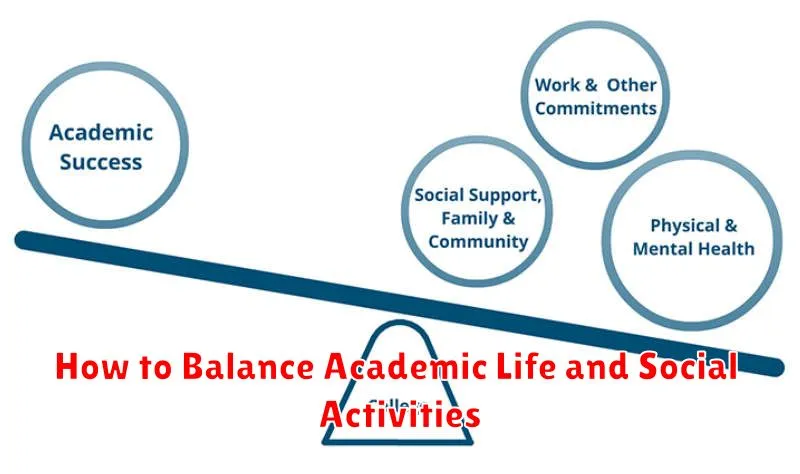Successfully navigating the complexities of college life requires a delicate balance between academic pursuits and social activities. Finding this equilibrium is crucial for student success, fostering both strong academic performance and a fulfilling social life. This article will provide practical strategies and actionable tips to help students effectively manage their time and prioritize tasks, allowing them to excel in their studies while maintaining a healthy and vibrant social life. Learn how to juggle coursework, exams, and extracurriculars with social events, friendships, and personal time, achieving a harmonious academic life and social life balance.
Many students struggle to find the right balance between the demands of their academic life and the desire for a rich social life. The pressure to achieve high grades can often feel overwhelming, leaving little room for socializing and relaxation. Conversely, an overly active social life can detract from academic focus and lead to decreased performance. Mastering the art of time management, prioritization, and effective scheduling is essential for students seeking to thrive in both their academic and social spheres. This article offers practical guidance to help students achieve this balance, ensuring a fulfilling and successful college experience.
Understand Your Priorities
Successfully balancing academic and social life requires a clear understanding of your priorities. Ask yourself: What is most important right now? Is it achieving a certain GPA, participating in a specific club, or maintaining strong friendships?
Prioritizing doesn’t mean neglecting one area entirely. It means allocating your time and energy effectively. Recognize that priorities can shift over time. What’s crucial this semester might be less so next semester, and that’s okay. Regularly reassess your priorities to ensure they align with your current goals.
Create a Time Management System
A well-structured time management system is crucial for balancing academic and social life. Start by prioritizing tasks. Identify your most important academic deadlines and social events.
Schedule everything. Use a planner, calendar app, or even a simple to-do list. Allocate specific time slots for studying, attending classes, and engaging in social activities. This will help you visualize your commitments and avoid conflicts.
Join Meaningful Campus Groups

Connecting with like-minded individuals is key to a fulfilling college experience. Joining campus groups offers a great way to balance academics and social life. Choose groups aligned with your interests, whether academic, social, or recreational. This can be a sports team, a debate club, a volunteer organization, or even a study group for a particular subject.
Active participation in these groups provides structure to your free time and minimizes aimless procrastination. It fosters friendships, builds valuable skills, and offers a sense of community within the larger campus environment. Joining groups helps manage stress by providing an outlet for your passions and fostering a sense of belonging.
Set Weekly Academic Goals
Establishing clear academic goals for each week is crucial for maintaining balance. This practice provides structure and direction amidst social commitments. Begin by reviewing your syllabus and identifying key tasks, assignments, and deadlines.
Break down larger assignments into smaller, manageable steps. Schedule specific times for studying, attending lectures, and completing assignments, treating these appointments with the same importance as social engagements. Prioritize tasks based on deadlines and importance. This approach promotes efficiency and helps prevent feeling overwhelmed.
Avoid Burnout by Scheduling Breaks
Preventing burnout is crucial for maintaining a healthy balance between academics and social life. Scheduled breaks are essential, not a luxury. They offer time to recharge, reducing stress and improving focus.
Integrate short breaks throughout your study sessions. A 5-10 minute break every hour can significantly improve concentration. Use these breaks to stretch, walk around, or simply relax your mind.
Longer breaks are equally important. Schedule downtime during the week for activities you enjoy, whether it’s socializing, exercising, or pursuing hobbies. This helps prevent academic overload and promotes overall well-being.
Leverage Campus Resources
Maximize your college experience by utilizing available resources. Academic advisors can help create balanced schedules and connect you with tutoring services. Time management workshops offer practical strategies for organization and productivity.
Explore campus health and wellness centers for stress management techniques, including counseling and mindfulness programs. These resources are designed to support students in achieving a healthy balance between academics and personal life.
Practice Saying No
One of the most crucial skills for balancing academic and social life is learning to decline invitations. It’s okay to say no to social events if you have pressing academic deadlines or simply need time for yourself. Prioritizing your academic commitments will benefit you in the long run.
Practice polite but firm ways of declining. A simple “I can’t make it this time, but thanks for the invite!” is often sufficient. You don’t need elaborate excuses. Saying no allows you to focus on your studies and avoid burnout.
Stay Organized Digitally
Managing your academic and social calendars effectively is crucial. Leverage digital tools to streamline your schedule. Digital calendars are essential for keeping track of deadlines, appointments, and social events.
Use a single platform to manage both academic and social commitments to avoid conflicts and ensure a balanced schedule. Set reminders for important deadlines and events to stay ahead. This will minimize stress and allow you to fully enjoy both aspects of your life.
Engage in Healthy Social Habits
Prioritize quality over quantity in your social interactions. A few close friendships can be more fulfilling than a large, but superficial, social circle. This allows you to invest meaningfully in relationships without overwhelming your schedule.
Set boundaries with friends and social events. It’s perfectly acceptable to decline invitations if you need to focus on academics. Communicate your needs clearly and respectfully.
Schedule social activities like you would any other important commitment. This helps integrate socializing into your routine without letting it encroach on study time.
Evaluate and Adjust Regularly
Maintaining a healthy balance between academics and social life requires consistent evaluation and adjustments. Regularly reflect on your schedule and how you’re feeling. Are you feeling overwhelmed or burnt out? Or are you feeling isolated and disconnected? Honest reflection is key.
Adjust your schedule based on your reflections. Perhaps you need to dedicate more time to studying for an upcoming exam, which might mean temporarily reducing social engagements. Conversely, you might find that you need to prioritize social activities to avoid burnout and maintain a healthy mental state. This could involve scheduling regular breaks for socializing or joining a club or organization.

